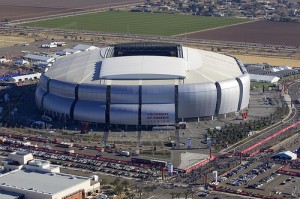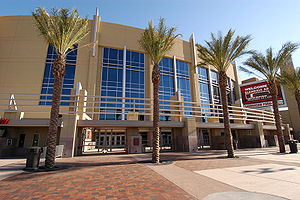Jim Neveau, NHL Correspondent
After a months-long investigation into improprieties on the part of the board of the directors of the Fiesta Bowl, a damning new report has officials scrambling, and officials from the Bowl Championship Series questioning the game’s continued presence in their organization.
In an email discussing the findings of the report, the BCS stated that the Fiesta Bowl must prove “why it should remain a BCS bowl.” The statement comes after reports surfaced that members of the game’s board of directors had taken part in various lurid activities, including going to strip clubs to “conduct business,” as one official was quoted as saying. The biggest bombshell in the whole report was the revelation that employees were encouraged to make political contributions, and then reimbursed via phony bonus checks. Some of these employees even said that they were pressured into lying to investigators about the practice. A task force has been formed by the BCS in order to determine the Fiesta Bowl’s standing in its organization.

While there is plenty more to discuss from the NCAA and college football’s side of things, the matter relevant to the NHL and the city of Glendale was the comment in the reaction email suggesting that the BCS is at least considering taking the game out of its rotation. The bowl is one of four games (along with the Rose, Sugar, and Orange Bowls) that comprise the BCS, and as a member of that group the game gets to also host a National Championship Game every four years.
As part of this rotation, the revenue benefits are enormous. Each of these four bowls raises a lot of money both from advertising around the stadiums, but also from the fans who travel long distances to see their teams play in these important games. When a site hosts the championship game as well (as the Fiesta Bowl did this year), all benefits are doubled. Fans from two other teams come to town, and the national interest is intensified, meaning more revenue.
The reason all of this is relevant is because the Fiesta Bowl, and the national title games that come with it, are hosted every year at the University of Phoenix Stadium, which is adjacent to Jobing.com Arena, home of the Phoenix Coyotes. Obviously this game brings a ton of tourism revenue into Glendale’s coffers (as well as nearly $30 million to the bowl organizers in 2009), and if it were to go away as this comment would suggest that it might, it would be an enormous blow not only to the city’s economy, but the state’s as well.
With that dark cloud hanging over the future of the Fiesta Bowl, the city of Glendale might be encouraged to put more emphasis on resolving the Coyotes ownership situation once and for all. Selling the bonds to keep the team in Arizona has been the last remaining step in getting the sale of the team completed, but with pressure from the Goldwater Institute bearing down on them, those bonds have become increasingly difficult to sell.
In recent weeks, potential owner Matthew Hulsizer has made several concessions to alleviate the concerns of the Institute, including guaranteeing that the entire $100 million in bonds that need to be sold to help finance the sale will be paid back, regardless of whether or not parking lot revenues are able to do that for the city. This move was met by acclaim from various corners, including from US Senator John McCain (R-AZ), but the Goldwater group is still not backing off of their threats of a lawsuit. The group still maintains that the bond sale is in violation of the gift clause of the Arizona constitution, and that it represents a type of “corporate welfare.”
With the Institute still standing defiant against Hulsizer, various entities, including McCain and the editorial board of the Arizona Republic newspaper, have spoken out against the group. Their contention is that GWI’s meddling has caused harm to the sale, and that if the Coyotes are allowed to leave as a result of their actions, that they will be responsible for dealing a huge blow to the economy of the city.

Now faced with the prospect of the Fiesta Bowl losing its luster (and ability to draw a wave of tourists to the Valley in the process), the city of Glendale might very well knuckle down and get the deal done even with the legal threats. NHL Deputy Commissioner Bill Daly has said that the league will keep the team in Arizona whether or not Goldwater brings a lawsuit against the city, but that is contingent on getting the sale done with the bond issue. The league is surely running out of patience with this whole process, and rumors are swirling that they have a buyer set in Winnipeg should the team need to move after this season ends.
While some will dismiss the talk of demoting the Fiesta Bowl as a bunch of bluster, the reality is that plenty of organizations would look to maneuver their bowl into its place. The most notable of these would certainly be the Cotton Bowl, which recently moved to the new Cowboys Stadium and has dramatically raised its national profile in the process. The organizers, and Cowboys owner Jerry Jones, would like nothing more than to muscle their way into the BCS, and their determination could be a potential problem for Arizona.
The nuts and bolts of the football game’s issues will be sorted out at a later time, but the more pressing concern of the Coyotes just got a sizable injection of urgency from this situation. If the Fiesta Bowl were knocked down a peg on college football’s totem pole, and if the Coyotes were to leave Glendale, it would be a double whammy that the city may never recover from.
It will be interesting to see whether or not the bowl’s woes have any impact on the sale, but one thing is for certain: an entire city will be holding its collective breath until both issues are resolved.